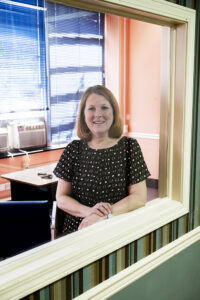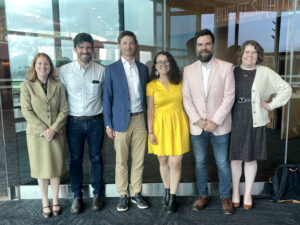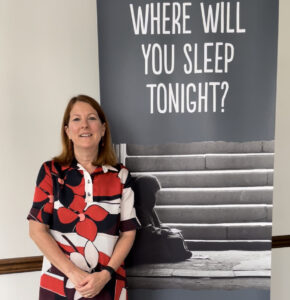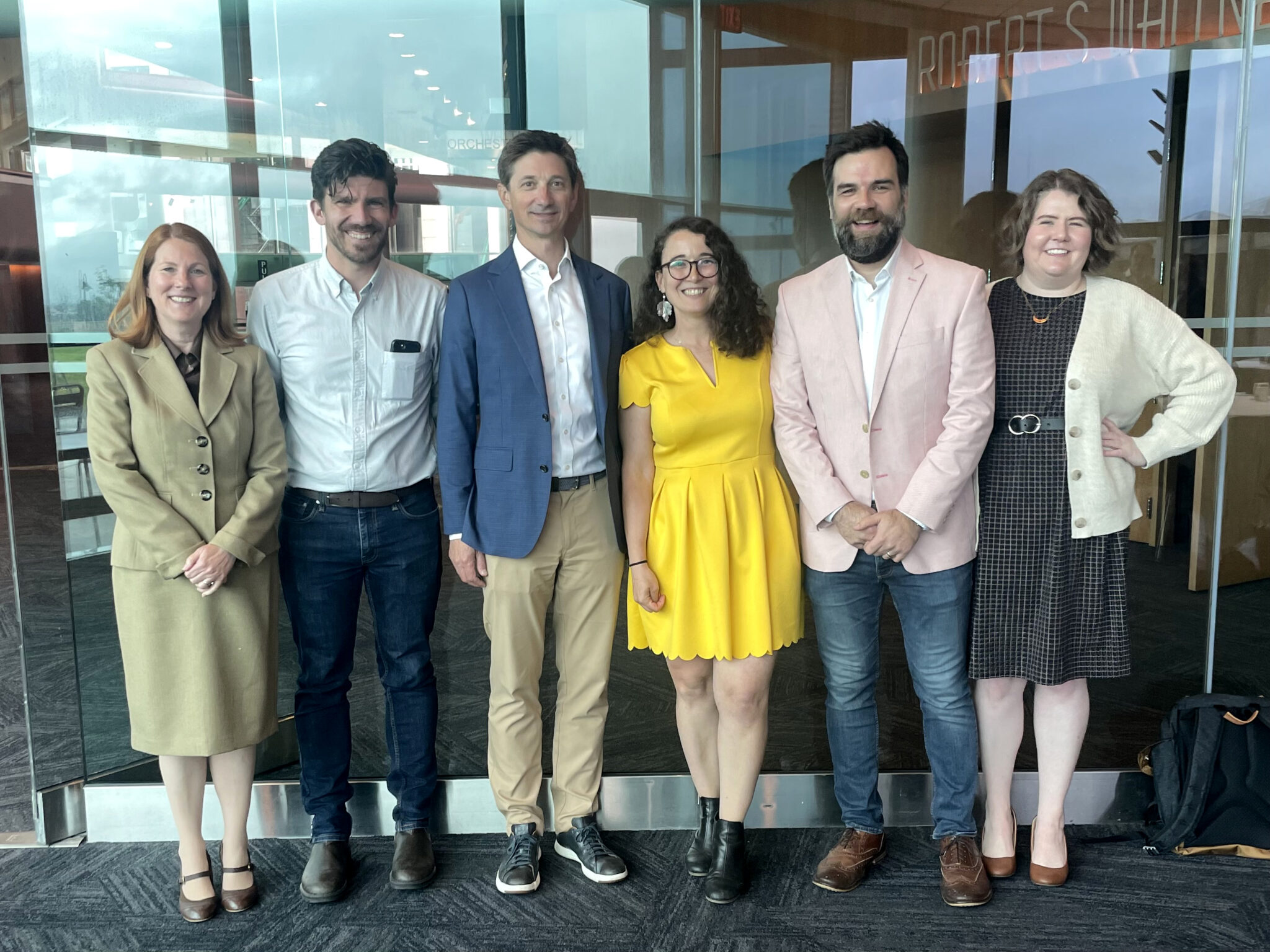Natalie Harris has hardly known a time when she wasn’t in the housing industry. It all started with a church in Birmingham.
“I grew up in Birmingham, Alabama, and I went to a church that took people to work on people’s houses,” she reflects. “I was able to do that in high school and then every summer while I was in college, and it really became a passion for me.”
These early experiences led her to pursue a career that would allow her to serve the unhoused. “I originally got into housing because it was so impactful,” she says. “You could immediately see how housing changes somebody’s life.”
Harris worked as chief executive officer of Miami Valley Housing Opportunities for about four years, where she “got to actually do the building itself – to start with a project, have an idea, get the funding, get the units built and renovated, and move people in. That was really good for me.”
Most of her other positions, however, have been as director, focusing on the coordination, resources and policy behind building projects, with organizations including the Kentucky Housing Corporation, Homeless and Housing Coalition of Kentucky, and Appalachia Service Project. She has also served as a consultant for various housing-focused organizations. Now she works as the executive director of Louisville’s Coalition for the Homeless.
“The Coalition for the Homeless was created to prevent and address homelessness here in Louisville,” she says. “We have been around for over 30 years, and were created when, across the nation, but also here in Louisville, there started to be an increase in homelessness, which had not been the case before. [We] were even seeing families that were becoming homeless in the ‘80s, so the city and county got together and created a task force. The Coalition for the Homeless is what came out of that.”
She says the organization’s team works as the overarching agency coordinating all the services of 40-plus different agencies serving homeless people. “That includes homeless shelters, night-and-day shelters, a health-care-for-the-homeless program, family health centers and legal services. There’s lots of outreach teams that go out on the streets to work with people there. All of those folks work together to try to create a system that’s more efficient and makes the best use of what limited resources we have.”
To Harris, it’s not an organization – it’s a team. “We work together to apply to the federal government every year to acquire homeless funding, and we have been very successful in bringing more money into Louisville, simply because we all work together. Working together does make a difference.”
The team includes a board whose members have experienced homelessness, and the team works in concert with currently unhoused community members. “The thing that is most exciting to me is when you can bring people together and increase the power of their voice, by not just being one person, but having a collective voice,” Harris says. “And because most of the people that we’re serving have very little power, they live lives where they get used to just feeling like, ‘I have no power. There’s nothing I can do here’ – when in truth, if those people could work together and share their voice, we can do more.”
That “doing more” ranges from passing bills to gaining ordinances and more.
 But working together doesn’t apply to the coalition team alone. It is the duty of every member of Louisville’s community. “[Don’t] be afraid to ask how you can help,” Harris says. “I think a lot of people feel a little paralyzed about the situation and don’t understand, ‘Why is homelessness happening? Why are there people who are losing their housing? [We] need to be concerned about the safety of the people who are losing their housing and make their homelessness as quick and easy as possible so that they can quickly move right back into housing. My challenge would be to ask, to read, to feel free to call us, and we can tell you more and tell you how to get involved.”
But working together doesn’t apply to the coalition team alone. It is the duty of every member of Louisville’s community. “[Don’t] be afraid to ask how you can help,” Harris says. “I think a lot of people feel a little paralyzed about the situation and don’t understand, ‘Why is homelessness happening? Why are there people who are losing their housing? [We] need to be concerned about the safety of the people who are losing their housing and make their homelessness as quick and easy as possible so that they can quickly move right back into housing. My challenge would be to ask, to read, to feel free to call us, and we can tell you more and tell you how to get involved.”
Harris has seen a strong community interest in learning how to help with housing. She hopes this passion will continue as the organization moves forward.
“[We] would love to continue to partner together because we are all stronger when we’re working together,” she says. “That includes the city, business leaders, churches and others in the community that can get involved. One, to speak up and say, ‘We need to do something about this,’ but also to volunteer, to donate, to get involved in working with all these different agencies.”
She encourages readers to visit the coalition’s website, where they can learn more about signing up to advocate. “That is [for] both local policy here in Louisville, but also doing statewide policy or trying to change state laws,” she says. In addition, the website’s Member tab displays a list of all the agencies the coalition organizes, and lists what donations and volunteer work each agency needs.
“[It] could be something as simple as coming and serving meals, or something as intense as going out and working with the outreach teams – meet with people, make sure they’re OK, help convince them to come inside,” Harris says. “Even providing after-school care to homeless children helps.”
These acts of service are one step in getting closer to realizing a mighty goal. “My goal would be to not need a Coalition for the Homeless anymore,” Harris says. “If we could have enough housing for everybody, then there really wouldn’t be an organization like ours. [There] would probably still need to be some direct service providers that are doing a limited amount of work for people who lose their housing, and then they can quickly get housed again. But there wouldn’t be a need for an organization that is coordinating over 40 different agencies, because we wouldn’t need that many agencies. That is our ultimate dream.”
Yet she turns her mind to the process of reaching her dream. “In the meantime, I think what is most important is for us to make sure that nobody has to sleep outside,” she says. “Even if that means increasing shelter, and prevention money – money to pay people’s housing bills so that they don’t become homeless in the first place – until we can get enough housing built, that’s important too, because people who are homeless now shouldn’t have to wait until enough housing is built.”
Harris has, in the course of her life, seen the immense impact that this work makes.
“Housing is so important,” she says. “I do this work because everything else rests on having it – your health, education, employment, safety, wealth, independence, family and more.”
As the coalition’s agencies continue to work to support Louisville’s unhoused residents in this sphere, she acknowledges their self-sacrifice, thanking “all of the people who work in the member agencies that are working so hard to keep people safe.”
Through their persevering efforts to coordinate an array of agencies, Harris and her team are working together to make not just houses, but homes.
For more information and to get involved, visit louhomeless.org.





